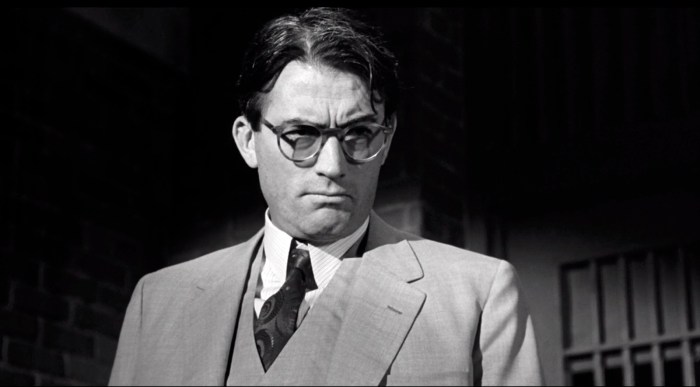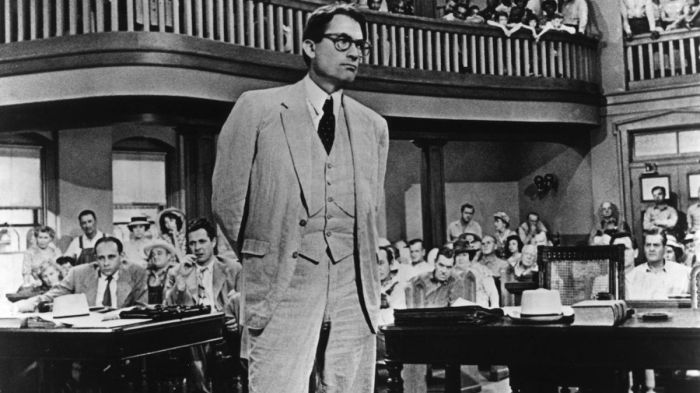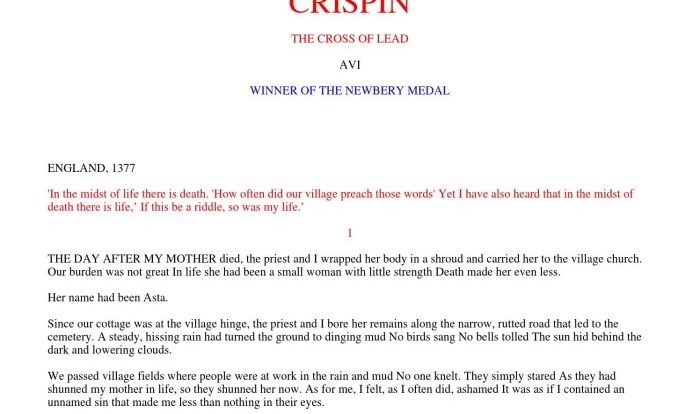To kill a mockingbird monologue – In Harper Lee’s classic novel “To Kill a Mockingbird,” monologues serve as powerful tools for character development, plot progression, and the exploration of profound themes. Through the eloquent words of Atticus Finch, these monologues resonate deeply with readers, leaving an enduring impact on their understanding of justice, empathy, and the complexities of human nature.
Atticus Finch’s monologues, delivered with wisdom, compassion, and unwavering conviction, provide profound insights into the novel’s central themes. They challenge readers to confront their own prejudices, question societal norms, and embrace the importance of integrity and empathy.
Introduction to “To Kill a Mockingbird” Monologue
Harper Lee’s “To Kill a Mockingbird” effectively utilizes monologues to convey the complex emotions, perspectives, and motivations of its characters. These soliloquies play a pivotal role in shaping the novel’s narrative and character development.
Role in Character Development
Monologues offer an intimate window into the inner workings of the characters’ minds. Through their spoken thoughts and reflections, readers gain insight into their fears, aspirations, and moral dilemmas. For instance, Atticus Finch’s monologue on the nature of prejudice highlights his unwavering belief in justice and equality.
Function in Plot Progression
Monologues also serve as catalysts for plot development. They reveal crucial information, foreshadow future events, and create dramatic tension. For example, Scout’s monologue at the novel’s conclusion serves as a powerful indictment of racism and foreshadows the tragic events that will follow.
Major Monologues in “To Kill a Mockingbird”

Throughout Harper Lee’s classic novel “To Kill a Mockingbird,” Atticus Finch delivers several powerful monologues that shape the novel’s themes and convey its central message. These monologues, often spoken during pivotal moments, serve as vehicles for Atticus to express his moral convictions, offer insights into human nature, and challenge prevailing societal norms.
Atticus’s Closing Argument
One of the most significant monologues in the novel is Atticus’s closing argument during Tom Robinson’s trial. In this powerful speech, Atticus appeals to the jury’s conscience and reason, urging them to reject the racially prejudiced accusations against Tom. He reminds them of the fundamental principles of justice and equality, arguing that “all men are created equal before the law.”
Atticus’s eloquence and unwavering belief in the inherent goodness of humanity highlight the novel’s central theme of fighting against injustice and prejudice.
Atticus’s Advice to Scout
Another notable monologue occurs when Atticus offers advice to his daughter, Scout, after she has been the victim of a violent attack. In this tender and poignant moment, Atticus encourages Scout to remain courageous and compassionate despite the harsh realities of the world.
He teaches her the importance of empathy, forgiveness, and standing up for what is right. Atticus’s words provide Scout with a moral compass and inspire her to embrace the values of justice and equality that he holds dear.
Atticus’s Eulogy for Mrs. Dubose
Atticus’s eulogy for Mrs. Dubose is a moving tribute to a woman who, despite her physical frailties, maintained her dignity and strength of character. In his eulogy, Atticus praises Mrs. Dubose for her courage, perseverance, and unwavering determination. He highlights the importance of moral integrity and the power of human resilience, reminding his listeners that even in the face of adversity, it is possible to live a life of purpose and meaning.
Thematic Analysis of Monologues

Atticus Finch’s monologues in “To Kill a Mockingbird” serve as powerful vehicles for exploring the novel’s central themes. Through his eloquent words, Atticus imparts lessons on morality, justice, and the complexities of human nature, shaping the novel’s message and guiding readers towards a deeper understanding of the human condition.
Moral Ambiguity
One recurring theme in Atticus’s monologues is the exploration of moral ambiguity. He acknowledges that life is not always black and white and that individuals are often faced with difficult choices that challenge their values. In his closing argument at Tom Robinson’s trial, Atticus confronts the jury with the harsh reality of racial prejudice, urging them to rise above their biases and uphold justice.
“In this country our courts are the great levelers, and in our courts all men are created equal.”
This monologue highlights the tension between the ideal of equality and the pervasive reality of discrimination, forcing readers to confront the complexities of morality and the struggle for justice in an unjust society.
Literary Devices and Techniques in Monologues: To Kill A Mockingbird Monologue
Atticus Finch’s monologues in “To Kill a Mockingbird” are powerful and memorable, not only for their content but also for their skillful use of literary devices and techniques. These devices enhance the impact and effectiveness of the monologues, allowing Atticus to convey his message with clarity, persuasion, and emotional resonance.
Similes
Atticus frequently employs similes to make his arguments more vivid and relatable. For example, in his closing argument, he compares Tom Robinson’s innocence to “a ray of light in a dark room.” This simile creates a powerful image that helps the jury visualize the injustice that Tom has suffered.
Metaphors
Atticus also uses metaphors to create extended comparisons that illuminate complex ideas. For example, in his speech to the jury, he compares the jury to “a group of reasonable men” who must “follow the evidence wherever it leads.” This metaphor emphasizes the importance of impartiality and objectivity in the courtroom.
Rhetorical Questions
Atticus frequently uses rhetorical questions to challenge his audience and force them to confront uncomfortable truths. For example, in his closing argument, he asks the jury, “Are we going to let one man go free because he’s black?” This question forces the jury to consider the implications of their decision and the potential consequences for society as a whole.
Irony
Atticus also employs irony to highlight the absurdity of certain situations. For example, in his speech to the jury, he points out that Tom Robinson is being accused of rape by a woman who has a history of lying and making false accusations.
This irony underscores the injustice of Tom’s situation and the prejudice that he faces.
The Impact of Monologues on the Audience

Atticus Finch’s monologues in “To Kill a Mockingbird” possess a profound emotional impact on the reader. These monologues, delivered with eloquence and wisdom, serve as powerful vehicles for evoking empathy, understanding, and critical thinking.
Eliciting Empathy, To kill a mockingbird monologue
Atticus’s monologues effectively draw readers into the emotional experiences of the characters. Through his words, readers gain insight into the struggles and triumphs of the characters, fostering a deep sense of empathy and compassion. For instance, in his closing argument, Atticus’s impassioned plea for Tom Robinson’s innocence exposes the racial injustice prevalent in the society, evoking a profound sense of empathy for the plight of the falsely accused.
Promoting Understanding
Atticus’s monologues also play a crucial role in promoting understanding among readers. By presenting multiple perspectives and challenging prevailing biases, these monologues encourage readers to critically examine their own beliefs and prejudices. For example, in his speech on the importance of justice, Atticus emphasizes the need to “stand up for what is right” regardless of the consequences, challenging readers to confront the complexities of morality and the societal pressures that often hinder it.
Inspiring Critical Thinking
Moreover, Atticus’s monologues inspire critical thinking by prompting readers to question the established norms and societal expectations. Through his insightful observations and thought-provoking arguments, Atticus encourages readers to analyze their own values, beliefs, and assumptions. For instance, in his famous “all men are created equal” speech, Atticus challenges the deeply ingrained racist attitudes of the time, prompting readers to reflect on the fundamental principles of human equality and dignity.
Monologues in Adaptation
The monologues in To Kill a Mockingbirdhave been adapted in numerous film and stage productions, each with its own unique interpretation of the novel’s message and themes. These adaptations have ranged from faithful renditions to more radical reimaginings, but all have sought to capture the power and emotion of Harper Lee’s words.
One of the most successful adaptations of the novel is the 1962 film directed by Robert Mulligan. The film’s monologues are largely faithful to the novel, and they are delivered with great skill by the cast. Gregory Peck’s performance as Atticus Finch is particularly memorable, and his monologues on justice, equality, and compassion have become iconic.
More recent adaptations have taken a more creative approach to the monologues. The 2018 Broadway production, for example, featured a number of new monologues that were written specifically for the stage. These monologues gave voice to characters who were marginalized in the novel, such as Calpurnia and Mayella Ewell.
By doing so, the production offered a more nuanced and inclusive perspective on the novel’s events.
Ultimately, the effectiveness of any adaptation of To Kill a Mockingbirddepends on its ability to convey the message and themes of the original novel. The best adaptations are those that are faithful to the spirit of the book while also finding new and innovative ways to bring its story to life.
Film Adaptations
- The 1962 film directed by Robert Mulligan is widely considered to be one of the most successful adaptations of the novel. The film’s monologues are largely faithful to the novel, and they are delivered with great skill by the cast.
- The 2015 film directed by Jeff Nichols is a more recent adaptation that takes a more creative approach to the monologues. The film features a number of new monologues that are written specifically for the screen, and it offers a more nuanced and inclusive perspective on the novel’s events.
Stage Adaptations
- The 2018 Broadway production directed by Bartlett Sher is a highly acclaimed adaptation of the novel. The production features a number of new monologues that are written specifically for the stage, and it gives voice to characters who were marginalized in the novel.
- The 2019 National Theatre production directed by Rufus Norris is another recent adaptation that has received critical praise. The production is notable for its use of movement and music to enhance the emotional impact of the monologues.
Top FAQs
What is the significance of monologues in “To Kill a Mockingbird”?
Monologues in “To Kill a Mockingbird” serve as powerful vehicles for character development, plot progression, and the exploration of profound themes. They allow characters to express their inner thoughts, motivations, and beliefs, providing readers with a deeper understanding of their personalities and the complexities of their experiences.
How do Atticus Finch’s monologues contribute to the novel’s message?
Atticus Finch’s monologues play a pivotal role in conveying the novel’s central themes of justice, empathy, and the importance of standing up for what is right. Through his eloquent words, Atticus challenges societal prejudices, encourages critical thinking, and inspires readers to confront their own biases and embrace a more compassionate and just world.
What are some of the key literary devices employed in Atticus Finch’s monologues?
Atticus Finch’s monologues are rich in literary devices, including similes, metaphors, and rhetorical questions. These devices enhance the impact and effectiveness of his words, creating a vivid and emotionally resonant experience for readers. For instance, his famous “all men are created equal” monologue employs powerful imagery and metaphors to convey the profound message of human equality.
How have the monologues been adapted in different film and stage productions?
The monologues in “To Kill a Mockingbird” have been adapted in numerous film and stage productions, with varying degrees of effectiveness. Some adaptations have faithfully captured the essence and power of Atticus Finch’s words, while others have taken more liberties with the original text.
However, the monologues continue to resonate with audiences, regardless of the adaptation, due to their timeless themes and Atticus Finch’s enduring appeal as a symbol of integrity and justice.
